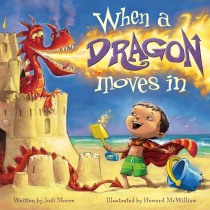4 Stars Drummer Boy of John John Mark Greenwood Frané Lessac Lee and Low Books Pages: 32 Ages: 4+ Jacket: Carnival is coming and the villagers of John John, Trinidad, are getting ready to jump up and celebrate with music dancing, and a parade. Best of all, the Roti King has promised free rotis—tasty friend [...]![]()
Viewing: Blog Posts Tagged with: author notes, Most Recent at Top [Help]
Results 1 - 5 of 5
Blog: Kid Lit Reviews (Login to Add to MyJacketFlap)
JacketFlap tags: food, holidays, boys, historical, celebrations, carnival, children's book reviews, melody, chicken, Caribbean, bands, drums, de, Lee and Low Books, calypso, Frané Lessac, Mark Greenwood, beaches, beats, drummer, limbo, dat, author notes, black sand, drummer boy, gourd, bass beat, biscuit tin, book glossary, bottle-and-spoon, Caribbean Islands, Caribbean Sea, chac-chac, coastal beach, fried pancakes, John John, John John Trinidad, maraca, metal pings and pongs, NonFiction, Historical Fiction, pirates, music, picture books, Favorites, African, ocean, tone, rhythm, spices, Atlantic Ocean, Holiday Book, picture book reviews, pancakes, run, note, tune, pitch, Trinidad, 4stars, Library Donated Books, white sand, roti, "Spree", book reviews, paartiee, shango drum, steel drums, streel drum, tamboo bamboo, Winston "spree" Simon, Winston Simon, Children's Books, Add a tag
Blog: Flashlight Press (Login to Add to MyJacketFlap)
JacketFlap tags: dragon, Awards and Honors, Author Signings, Library of Virginia, Author Notes, Jodi Moore, Award Ceremony, Cardozo Award, Add a tag
Jodi Moore accepted the Library of Virginia’s Annual Whitney and Scott Cardozo Award for Children’s Literature for When a Dragon Moves In last weekend! Here is her account of the event:
WOW! The evening – the weekend – was extraordinary… just amazing! I am still pinching myself…what a star-studded, lovely weekend I had!
Virginia is a beautiful state, filled with warm, wonderful people.
The day started out with a scrumptious luncheon at the Convention Center, where all nominees were honored with medals.
We were treated to a Q&A session with the incomparable Tom Robbins, who was honored with a Literary Lifetime Achievement Award. What a fascinating man!
Following the luncheon, people were encouraged to buy the honored authors’ books and we were positioned at tables for signing. I’m thrilled to report that lots of people “adopted” Dragons! I was also interviewed on Sirius radio!
Click to view slideshow.
Blog: Flashlight Press (Login to Add to MyJacketFlap)
JacketFlap tags: Author, Children's books, Interviews, Picture Books, Ideas, Children's authors, Tara Lazar, Author Notes, Add a tag
 PiBoIdMo= Picture Book Idea Month
PiBoIdMo= Picture Book Idea Month
Thirty ideas in thirty days wrapped in unlimited potential!
http://taralazar.com/2012/10/26/pre-pibo-day-2-donna-w-earnhardt/
Blog: Flashlight Press (Login to Add to MyJacketFlap)
JacketFlap tags: Play, Upcoming Books, Author Notes, Add a tag
Posted on the KaBOOM! site by Guest Blogger: Linda Ravin Lodding on September 14, 2011
 Originally from New York, Linda Ravin Lodding has spent the past 15 years in Austria, Sweden, and now The Netherlands, where she lives with her family in a one-windmill town. She is a working mom, shutter-bug, yoga class drop-out, cheesecake lover, hula-hooper, dreamer, and author of the wonderful children’s book, The Busy Life of Ernestine Buckmeister. Here, she reflects on the child- and play-friendly culture she has encountered in her new home:
Originally from New York, Linda Ravin Lodding has spent the past 15 years in Austria, Sweden, and now The Netherlands, where she lives with her family in a one-windmill town. She is a working mom, shutter-bug, yoga class drop-out, cheesecake lover, hula-hooper, dreamer, and author of the wonderful children’s book, The Busy Life of Ernestine Buckmeister. Here, she reflects on the child- and play-friendly culture she has encountered in her new home:
When my family first moved to the Netherlands, four years ago, it wasn’t just the quaint windmills dotting the landscape that tipped me off that we were living in a foreign land. Nor was it the tractor-wheel-sized rounds of cheese in our village shop. It wasn’t even the picture postcard views of tulips ‘ribboning’ through the fields. No. It was the children – biking, running around, and freely playing outdoors.
Let me explain. When we first arrived in The Netherlands, we decided that we’d “go Dutch” and cycle everywhere. My then nine-year-old daughter was keen. Her school is only a stone’s throw up the street – but it is a busy street with a tricky roundabout . To complicate matters, there are so many cyclists on the bike path that it feels like the Tour de France. So, naturally, I strapped a helmet on her head and off we cycled – together.
It was soon very evident (especially to my daughter) that no other parent was biking with their child like a Mother Goose making way for her gosling. Dutch children were biking by themselves — and not only to and from school. They were biking to the town, to their friends’ houses, to the beach, to their sports activities. I’d see children on bikes and wonder, where was the adult? Granted, kids here are basically born on bikes, but weren’t their parents worried that their little ones would get lost? Side-swiped by a bus? Plucked off the street by a pedophile?
Obviously Dutch parents didn’t have such concerns. Or, if they did, they decided to not let them get in the way of embracing a free-range childhood.
As a friend of mine said, “The dangers have always been here – it’s no more or less dangerous today than it has ever been in Holland, yet parents, on balance, opt to give their kids freedom and independence.” And she, like many Dutch parents, thinks this attitude leads to happier, healthier and more resilient children.
She may very well be right. A 2007 UNICEF study found Dutch children to be the happiest among children in the 21 industrialized countries surveyed.
That well-being seems to be cultivated at a young age through parents, schools and communities. “I want for my child the same kind of playful childhood that I had,” another Dutch friend of mine told me. “I tell my children to go out and play and not come home until their pants are ripped!”
Communities are also on board – especially as childhood obesity is on the rise here in The Netherlands. In an effort to reverse that trend, nearly every Dutch child is engaged in some sort of physical activity. As American schools slash recess and P.E. to make time for more sedentary classroom instruction, Dutch schools provide half-days every Wednesday so kids can pursue sports.
What else explains why Dutch children so happy? Play!
You only have to look at the painting, “Children’s Games” painted by Pieter Bruegel, the Elder over 400 years ago, to see that children in this region have been engaged in independent play for centuries.

Blog: Flashlight Press (Login to Add to MyJacketFlap)
JacketFlap tags: Author Notes, Holidays, Winter, Add a tag
by Jane Naliboff
 Every year, sometime in late November or early December, sometimes crossing over the biggest winter holiday for most Americans, comes Chanukah. Not a major holiday by any means, but one that is associated with gifts, delicious food, and family, if you’re lucky enough to have them near you.
Every year, sometime in late November or early December, sometimes crossing over the biggest winter holiday for most Americans, comes Chanukah. Not a major holiday by any means, but one that is associated with gifts, delicious food, and family, if you’re lucky enough to have them near you.
When my husband and I moved to the woods of central Maine with our then 14 month old, income was what we had in mind and there was a good job waiting for my husband amongst the piney woods and lakes. Not having family close by wasn’t an issue, we were strong, independent, and anxious to begin new traditions with our own little family that soon ballooned to five of us. Being on the secular side, we chose to offer culture and holidays that included food and gifts to our girls. Naturally Passover and Chanukah easily became their favorites.
Three small menorahs, three boxes of drippy, colored candles, star of David and dreidel cookies sprinkled with blue sugar, mountains of latkes and sour cream and applesauce, and a pile of blue and silver gifts was a happy time of year. One year we went to the small local Jewish group’s Chanukah celebration, but the girls didn’t like other people’s interpretations of the holiday, the lighting of at least 25 menorahs, more prayers than they had the patience to stand through, and “not as good as mommy’s” latkes. Our own celebration tradition lasted until the last daughter left for college, but even then, they each received packages in the mail, and they took along their little menorahs.
Something my youngest daughter said to me right around the start of Chanukah when she was in first grade sparked the idea for The Only One Club. She came home one day and said, “I’m the only Jewish kid in my class.” I asked her if she minded and she said, no, she liked it. It really didn’t matter. The next day I was volunteering in her class and out of the blue one of children said that he was only one with white eyebrows, and someone else said, they were the only one with red hair. And a book was born.
Using Chanukah as the starting point for this story of humanity worked well because it was the one thing that the other children noticed that was different about my daughters. As a true believer of the separation of church and state, I wasn’t particularly fond of the teachers asking them to explain Chanukah to the class and bring in a menorah every year, but they wanted to do it and I let them. For 99% of the children in their school in the woods, it was the only exposure they had to a religion that wasn’t based on Christian beliefs. Mentioning Chanukah categorizes The Only One Club as a ‘holiday” book which means that teachers will bring it out year after year and read it along with other winter stories. It has sparked hundreds of discussions across the country about why everyone is the only one, but that we all belong to the same club, that of humanity. My daughters have learned that now, instead of asking what I might like for Chanukah, they pool their money and make a donation to one of my favorite charities in my name. And I always hope I’m not the only one.
Happy Chanukah, or whatever you celebrate, to everyone!
Jane Naliboff is the author of The Only One Club. You can read more about Jane at www.janenaliboff.com.



